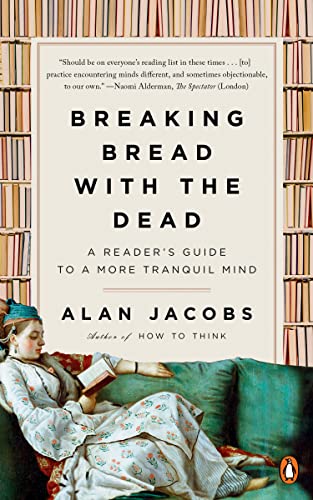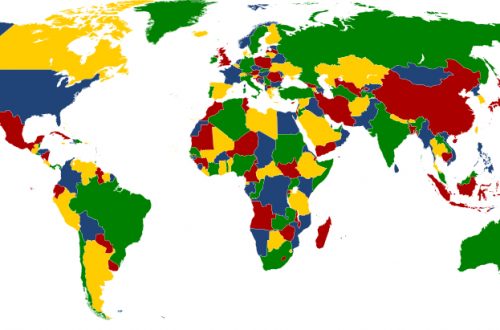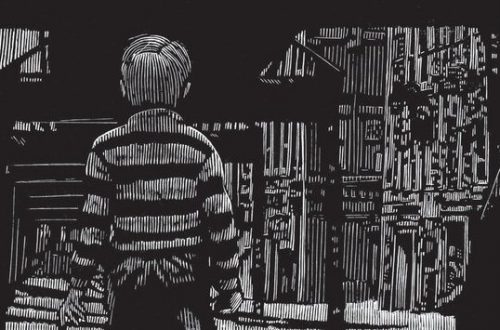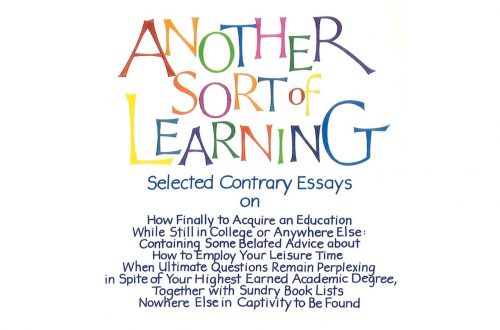by Benjamin D. Utter
Breaking Bread with the Dead: A Reader’s Guide to a More Tranquil Mind
by Alan Jacobs
Penguin Press. 2020; 192 pp., $16.00
. .
Can books make us good? Many of my university students seem to think so, or at least to assume that I think so. When I ask them just what the heck “literature” actually is and why anyone ought to bother with it, many of them dutifully genuflect with all the reverence due something wholly unknowable and recite with unconvincing earnestness the various reasons why books are “good for you” – as if describing the benefits of kale.
C.S. Lewis, for one, didn’t think reading was a prerequisite for virtue. In An Experiment in Criticism, he allows that the non-literary person “may be full of goodness and good sense,” perhaps more of it than many of the literary, and in his essay on “Learning in Wartime” he forcefully rejects “any idea that lingers in the mind of some modern people that cultural activities are in their own right spiritual and meritorious—as if scholars and poets were intrinsically more pleasing to God than scavengers and bootblacks.”
And yet the idea lingers still. It is obvious from Alan Jacobs’s latest book, Breaking Bread with the Dead: A Reader’s Guide to a More Tranquil Mind, that he has encountered similar assumptions in his students. Though he makes plain in the preface that “I write here not as a teacher to students but rather as a reader to other readers,” the classroom is nevertheless on his mind: “Much of what I have to say here is what I have tried to convey to my students, though rarely in terms as explicit as I lay out here. Maybe some of my former students will read this book and think, Oh, that’s what he was up to.”
One of the things he’s up to here in this apologia for reading long-expired writers is to follow C.S. Lewis (about whom Jacobs has written an excellent biography) in swatting away the idea that books should be ladled down young throats as a kind of moral medicine. Instead, Jacobs suggests, the reader should come to books as to a feast laid out before our minds, emotions, and senses. And as the title of the book suggests, it’s not a lonely meal. Taking as his banner the poet W.H. Auden’s remark that “Art is our chief means of breaking bread with the dead,” Jacobs explains that “Breaking bread is at the heart of this project: sitting at table with our ancestors and learning to know them in their difference from, as well as their likeness to, us.”
That reading is not a moral duty but rather a pleasure with potential moral benefits is a point Jacobs has made at greater length in previous books. Readers of The Pleasures of Reading in an Age of Distraction (2011) and How to Think: A Survival Guide for a World at Odds (2017) will recognize in this work the continuation and confluence of a number of his favorite themes: the delights to be found in books, even—or perhaps especially—in old ones; how that delight can be dulled by the tyranny of presentism; and how to cultivate creativity, charity, and intellectual humility during a time when worship of what Kipling called “the wind-borne Gods of the Market Place” has become the global religion.
If “breaking bread with the dead” does not necessarily make us good, it may at least help to quiet our unquiet minds and in so doing help us stand more firmly against forces that profit from coaxing us to lead lives of chronic outrage and shallow triviality. That’s certainly the aim of this book. Jacobs observes, “We live thinly in our instant, and don’t know what we don’t know.” Some might think this an unlikely dilemma for citizens of the information age, but one of Jacobs’s key arguments here is that it’s a grave error to assume that access to data amounts to intelligence, to say nothing of wisdom: “an environment of high informational density produces people of low personal density.” Borrowing a passage from Pynchon’s Gravity’s Rainbow, Jacobs makes the point that “personal density is directly proportional to temporal bandwidth,” which is “the width of your present, your now . . . The more you dwell in the past and in the future, the thicker your bandwidth, the more solid your persona. But the narrower your sense of Now, the more tenuous you are.” Thus, attending to the past by breaking bread with the dead may serve to stouten the thin soul as well as help settle the Twitter-addled, or as he puts it, “twitchy,” mind.
But why all this literary necrophilia? Why not seek nourishment among the living? For one thing, we aren’t always very good at trying. Jacobs’s own students (much like mine, I’m afraid) attest as much, for when he enters the classroom, “fairly regularly the first thing I see is every head bowed before a glowing screen.” Well, it’s hard to blame them. As most of us probably don’t need a book to tell us, engaging with other people can be exceedingly difficult, our differences, real and perceived, too readily dividing us. The dead, by contrast, can be more companionable, coming as they do from so great a distance that, as Simone Weil puts it, they “[offer] no food for our passions.” Even so, they too may shock us with their difference—and shock us they should, Jacobs argues! “Relatability” is not entirely off the menu, but difference is the main course, for to sit at this table is to accept an invitation to relate to the dead not in spite of but precisely because of their “unrelatability.” As Jacobs explains, “Reading old books is an education in reckoning with otherness; its hope is to make the other not identical with me but rather, in a sense, my neighbor.”
And such neighbors! In nine short but rich chapters, we encounter brief but close readings of works from writers ranging from Homer, Horace, Plutarch, and Epictetus to Machiavelli, Milton, and Keats, among many others. These are by no means hagiographical appreciations, though, for Jacobs foregrounds the ways in which their sensibilities may offend ours and argues, calmly but ardently, for ways in which to reckon with Aristotle’s sexism, Hume’s racism, Edith Wharton’s anti-Semitism, without banishing the writers themselves altogether.
Jacobs’s voice is at once learned and warmly intimate, addressed, as the book’s subtitle suggests, to the individual reader. But an urgent concern for the body politic undergirds these arguments, as well. Though he never states it directly, it seems clear that among the things Jacobs seeks in this book is a way of thinking about human relationships that transcends the so-called “identity politics” of our current political moment—and indeed of every moment preceding ours. (The question “who is my neighbor?” is not, after all, a new one.) How can we acknowledge the sins of the past and the persistent injustices of the present without surrendering giddily to self-righteousness and condemning the “wicked” other side? In a way, this book is an intervention at the battle lines of the culture war. One such front is between the insights of all that has been subsumed under the rather crude label of “Critical Race Theory” on the one hand, and those denouncing the supposed excesses of critically examining a cherished national past on the other. Engaging with a quotation from political scientist Mark Lilla, Jacobs writes:
. . . striving to understand the people of the past “as they understood themselves,” is a mark of fairness to them; but it is also good for us. [Lilla] points out that “the concept of ‘racism’ is today applied to everything from theories of racial inferiority and calls for genocide to unintended ‘microaggressions’ against particular individuals,” which means that “a small forest of useful concepts that used to grow between ‘racism’ and ‘woke-ness’—blindness, stereotyping, prejudice, bigotry—has been cleared. Consequently, we are losing the ability to understand how people in the past thought about their attitudes and actions, and therefore are losing the ability to make proportionate moral judgments.” That we simplify our judgments in the cause of triage, the management of information overload, is understandable, but the resulting impulsiveness leaves us unable to count, or even to acknowledge, the costs of our simplifications. We thereby become uncharitable to our ancestors—and to ourselves, whom we are depriving of one of the most vital traits imaginable: “the ability to make proportionate moral judgments.”
This is beautiful and vital stuff, even if I found myself wondering whether his repeated emphasis on proportionality risked amounting to a kind of reflexive “both-sides-ism” and thus to an implicit argument for withdrawal from worldly political concerns altogether.
In the book’s ninth and final chapter, for example, Jacobs performs a splendid close reading of Seamus Heaney’s “Sandstone Keepsake,” in which the poet describes himself “wading a single beach on Inishowen,” along the border between the Republic of Ireland and Northern Ireland. Though surrounded by the tension of the Troubles and surveilled by wary British soldiers, when he lifts from the water “a wet red stone” the poet’s mind travels to the distant past, the stone transformed in his imagination to the heart of Henry of Almain and the cold water to the river of boiling blood in which Henry’s murderer, the English aristocrat Guy de Montfort, is condemned to stand in Dante’s Inferno. This obscure tangle of medieval history, literature, and the political turmoil of the 1980s parts easily before Jacobs, who explains how Heaney’s poem links the Irish Troubles to the thirteenth-century Barons’ War against King Henry III and the papal politics that formed the background for Guy de Montfort’s murderous revenge on Henry of Almain. The power of Heaney’s poetic imagination, he suggests, is emancipatory:
As Heaney held the wet red stone he wasn’t in the Republic of Ireland; he dwelt in his own “free state of image and allusion,” his own populous mental world; the British soldier with his “trained binoculars” understood that the man “out for the evening in scarf and waders” posed no threat: he was “not worth bothering about.” Not a militant, nor any sort of revolutionary; not even an activist; but rather one who venerates, one who attends worshipfully to what he loves: stones in salt water, old poems long remembered, things that can be held close as keepsakes.
For Jacobs, what is admirable here is not only the poet’s historical imagination but his political quietism:
People in Ireland always wanted Heaney to take sides, to join the revolution or at least to speak out; but he was, by temperament and perhaps also conviction, “one of the venerators,” and therefore “not about to set things wrong or right.”
Heaney’s reluctance to intervene was, Jacobs observes, “Disappointing to the activists, surely.”
This is not the only moment in which “activist” occurs as pejorative, and it struck me that while Jacobs does a fine job of parsing Heaney’s allusions to Dante, he never mentions—amid all the cautionary talk about “taking sides” and an oblique critique of “activism”—the Vestibule of Dante’s hell, where dwell the Opportunists, those who never took a side:
These are the nearly soulless
whose lives concluded neither blame nor praise.
They are mixed here with that despicable corps
They are mixed here with that despicable corps
of angels who are neither for God nor Satan,but only for themselves.
(Canto III, 32-36, tr. Ciardi)
Jacobs is not, of course, advocating neutrality of this damnably selfish sort, but in a book that borrows its structural principle of an ascent up a “winding stair” from Yeats, I would have welcomed a pause along our climb just long enough to stipulate that while the summons to a more tranquil mind means resisting what Yeats himself called “passionate intensity,” it is by no means an invitation or excuse to “lack all conviction” about the urgent problems assailing the world.
But then, this is not, as Jacobs said, a book written primarily for students. If it were, perhaps he would have warned more explicitly about the perils of civic insouciance as well as outrage.
That said, this is a lovely book—indeed, it is a book for lovers. Readers who make it all the way to the conclusion (whether driven by duty or drawn on, as I was, by the pleasure of his prose) will find that Jacobs brings to this stirring climax the argument along which he has been winding:
. . . ideas and ambitions aren’t worth much unless they are transformed into a settled disposition, a habit of mind. And what I’m talking about, and indeed have been talking about throughout this book, is the need for a disposition to love: to love the too-often-neglected voice from our past, from the world’s past.
Attention is indeed, as Simone Weil has suggested, a form of love, but Jacobs enlarges on the idea to suggest that to pay attention is to confer love on more than just the object of that attention: “. . . what I counsel is to give the dead the blood of our attention for our own sake, to enrich and strengthen our identities, to make ourselves more solid and less tenuous—and then . . . to use the solidity we have gained to help us make meaningful promises to the future” (emphasis mine). He continues, “There’s an important sense in which we cannot use the past to love ourselves unless we also learn to love our ancestors. We must see them not as others but as neighbors—and then, ultimately, as kin, as members of our (very) extended family.”
There may be readers who regard this attempt to dissolve tribalism in the solvent of love of the broader human tribe as naive or facile. Others, though, might find it quite radical, for what Jacobs isn’t doing—and what he forbids us doing—is averting our eyes from the sins as well as the merits of the past. In a discussion of Frederick Douglass’s speech, “The Meaning of July Fourth for the Negro,” in which Douglass praises America’s founders as “great men” before proceeding to condemn their beliefs and actions with respect to slavery, Jacobs writes, “The idealization and demonization of the past are equally easy, and immensely tempting in an age of social acceleration. What Douglass offers instead is a model of negotiating with the past in a way that gives charity and honesty equal weight.”
Whether or not reading old books can make us good, devouring this delicious new one surely can’t hurt, for in it we find a mode of reading that summons us to charity and honesty, and thus to humility, making us less assured of our own righteousness and less frantic at the apparent folly of our living neighbors.

Dr. Benjamin Utter has worked as a paperboy, a field hand, a sandwich artist, a barista, door-to-door salesman, a valet, a bookseller, an English teacher in China, a Peabody Hotel Duck Master, a 7th-grade history teacher, and a Christian heavy metal radio DJ, but since none of those jobs offered many chances to teach Chaucer, he settled down to a respectable life as an assistant professor of English, and currently teaches at Ouachita Baptist University. He has published on the Arthurian poetry of Charles Williams and on medieval iconography in modern American gun culture, among other things, and written an illustrated children’s book, “Gladys the Grayish Green Dragon,” which his children rate “not as good as Harry Potter.”





